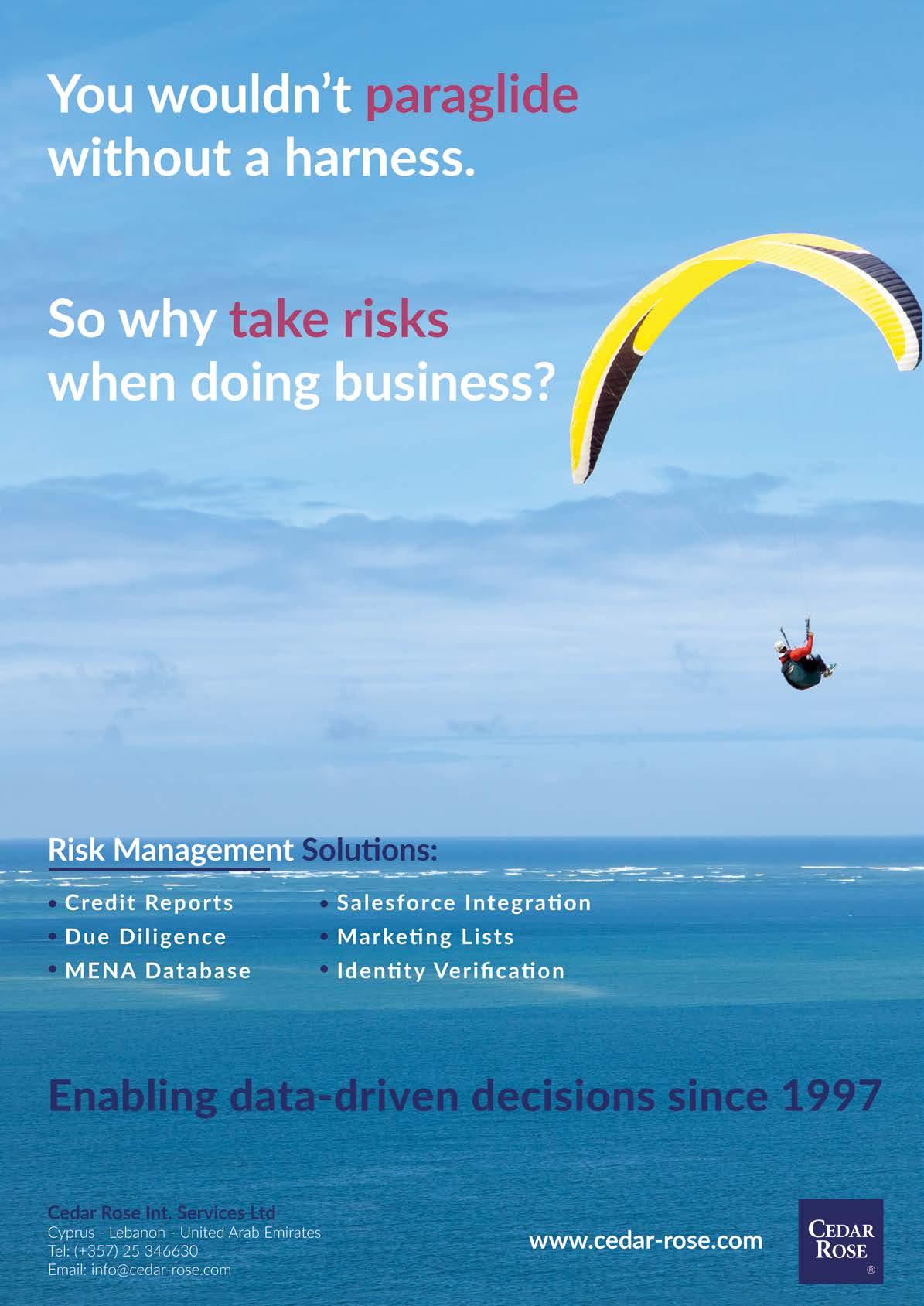
9 minute read
Unlocking MENA Data
Unlocking MENA Data – The Fuel to Grow Your Business
By Jack Evangelides, Marketing Executive, Cedar Rose
The Middle East and North Africa (MENA) region can be construed as a difficult area to maximise business potential due to the lack of information, or more specifically, the lack of access to information. Digitalisation of datasets, openaccess to data framework and overall data availability is scarce in MENA, therefore, it requires a lot more research and innovation to utilise the hidden gems that the region has to offer. The MENA economy is rapidly growing; innovation, sustainability and advanced technologies are spreading, from the likes of the Dubai 2020 Expo, which focuses around sustainability, to the Saudi 2030 Vision, which is set to transform the country, it is evident that the MENA region is rapidly transforming in some areas at least. Henceforward, this region poses huge potential for investment, growth and sustainability; so how do we identify potential clients, onboard them swiftly while adhering to compliance and regulatory requirements, ensure they are credit worthy and remain compliant by monitoring them when reliable data seems elusive?
DATA, DATA, DATA
The growth of data over the last decade has placed a standard of data requirements that countries should meet for the best interests of their citizens. From the General
Data Protection Regulation (GDPR) 2018 to the Consumer Data Privacy Legislation 2019, nations around the globe are putting together frameworks to not only provide users with valuable data but also to protect their sensitive data from unauthorised disclosure. Open data provides citizens with a platform to hold and assess their governments, demand accountability and to ensure transparency. However, according to the Open Data Barometer, many governments fail to meet the basic Open Data Charter principles. Specifically, the Middle East and North Africa region, as a whole, has been lagging behind a huge proportion of the world with regards to providing their citizens with an open data framework, accessible datasets and, therefore, the ability to demand accountability of governments.
THE OPEN DATA CHARTER
This charter, developed in 2015, consists of six core principles in which governments across the globe agreed upon. The charter lays out foundations and norms concerning how to publish data. The six core principles are:

1) Open by Default:
This principle assumes that governments should hold open publications for all to access and any governmental data that is private needs to be justified, such as security or privacy motives. Governmental norms tend to convey the process that citizens must express a desire to have such information as a prerequisite; nonetheless, this charter rightly aims to hold governments responsible for displaying data open and publicly accessible for all.
2) Timely and Comprehensive:
Data held must be up-to-date and relevant for citizens to view. Although data should remain in its original unmodified state, it is only valuable if it is relevant.
3) Accessible and Usable:
Data must be easily accessible for citizens, for example displayed in a clear easy-to-use online portal as some nations currently have. Additionally, file formats and machine readability are two factors that must work with the user in order to benefit those accessing it.
4) Comparable and Interoperable:
Data is best organised when separated into relevant datasets with open access to all of them. The ability to compare across multiple datasets allows the user to gain more potential value from them.
5) For Improved Governance:
Citizens can hold governments accountable through open data, allowing them to see what the representatives are actually doing. Additionally, it creates a more transparent government, which can aid to public services and ensure correct accountability. Moreover, open data also created more informed voters, which can result in improved governance.
6) For Inclusive Development and Innovation:
Open data can have limitless implications for improving countries, socially, economically and politically. For example, data can highlight climate change actions or highlight the need for reforms to support climate change.
MENA’S CURRENT OPEN DATA STRATEGY
Unfortunately, the Middle East and North Africa region is as a whole failing to progress on open data. MENA countries show low rankings with all, except for one, of the nation’s outside of the top 50 and, worryingly, little strategy in place to provide open data for their citizens. The latest Open Data Barometer (4th Edition) analyses the following countries across the MENA region: Bahrain, Egypt, Jordan, Lebanon, Morocco, Palestine, Qatar, Saudi Arabia, Tunisia, United Arab Emirates and Yemen. The Open Data Barometer scores countries based on three factors, each weighted differently, Readiness, Implementation and Impact.
• Readiness:
The measure of making a countries data readily available and open to the public. Additionally, if governments are working towards strategies to improve open data.
• Implementation:
The implementation of datasets that are accessible across the region. To work towards opening platforms that display open data.
• Impact:
Assessing the impact of open data, utilising the figures to create policy and positive progress within the region.
The MENA region’s latest figures show a collective average score of 18/100, with Readiness 34/100, Implementation 17/100 and Impact 10/100. These figures immediately show a disinterest for the nations to enhance their open data availability to the public. Almost all countries dropped in rankings, despite governmental initiatives and strategies, which had been implemented a few years ago. Although limited, a few nations have begun to enhance their open data, for example, the United Arab Emirates (UAE). The UAE has an open portal, Bayanat, which displays government data in their plea to enhance governmental transparency. Nonetheless, it is evident that the MENA region is in need of a strategy to bring about open data and enhance availability for their citizens. Typically, due to a lack of civil society engagement with open data, citizens hold no desire to pressure governments to make data publicly available, especially in relation to social issues.
CEDAR ROSE’S MENA DATA
Cedar Rose has long understood and recognised the lack of data across the MENA region, the scarce datasets publicly available, the lack of strategy and technology in place to hold the data and the lack of desire for governments to openly display data. Therefore, over the last 23 years we have been committed to bringing MENA data to an online platform. We believe in using data to make the best decisions, especially for economic reasons such as risk management, compliance, due diligence and credit control. Cedar Rose has compiled a database which holds data on over 12 million companies and over 23 million individuals across the MENA region. We have researched, collected and cleaned data across MENA and compiled it into an easy-to-use database. We have overcome major difficulties such as data that has not been digitalised, data that is not publicly available in the English language, data that is not standardised to internationally recognised formats such as UKSIC or IFRS and data that has been recorded incorrectly. We have rectified all of these issues to create an excellent quality database of businesses and associated people within the entire Middle East and North African region. Our Cedar Rose Int. Services (CRiS) Database may be the key to all of your risk management problems, a solution to mitigating risk and instigating business safely across the MENA region.
CONTACT
Use the email info@cedar-rose. com for more information about our CRiS Database and how CRiS can help you to know who you are trading with in MENA, to mitigate the risk of non-payment or noncompliance or to recognise new potential clients for your business to grow.

Ross Milton, Managing Director - Bounce

CBD Corporate Services Limited (CBD) is a Dubaibased corporate services provider which offers a regulated approach to the facilitation and sponsorship of new and existing businesses in the UAE and wider Middle East region. It has over 30 years’ of legal and commercial expertise in advising and assisting international organisations and entrepreneurs with their UAE market entry.
Specialising in corporate structuring and the provision of professional sponsorship and nominee partnership services, CBD can easily identify and deliver the right solution for its clients to support their legal, commercial and operational needs.
Its knowledgeable and friendly team of operational experts deliver a full range of business support services from company registration and licensing, to obtaining and renewing UAE residency visas for CBD clients and their families.
Approved suppliers of specialised plastic technology

ADD VALUE TO YOUR PRODUCTS BY CHANGING YOUR MATERIALS TO EITHER:

BIODEGRADABLE - FLAME RETARDENT - ANTIMICROBIAL - ANTI-INSECT ETHYLENE OR ODOUR ADSORBENT - RODENT REPELLENT
d2 w causes plastic to become rapidly biodegradable if it gets into the open environment. It is approved by SASO (Saudi Arabia) and ESMA (UAE), Jordan and the Kingdom of Bahrain where use of this technology is mandatory. Symphony’s Healthcare Division has developed a suite of masterbatches to protect against bacteria, viruses, fungi, insects, and other threats to human health.
Contact our friendly and experienced staff who are keen to help you meet the demands of your customers.
- Arab speaking desk -
For more information please visit our websites or contact: sales@d2w.net
SERVICES
ة َّ ي ِ ن ا َ ط ي ِ ر ِ ب ل ا ة َّ ي ِ ب َ ر َ ع ل ا ة َ ر ا َ ج ّ ِ ت ل ا ُ ة َ ف ْ ر ُ غ

A R A B B R I T I S H C H A M B E R O F C O M M E R C E
FCO
BUSINESS DROP-OFF SERVICE
PREMIUM SERVICE
The Chamber provides either a standard next day service via the Milton Keynes FCO Office, or for the more urgent time sensitive requirements we can provide a same day premium service.
Should you require further details, or to make use of this service please contact Mr Cliff Lawrence at cliff.lawrence@abcc.org.uk or 020 7659 4881











